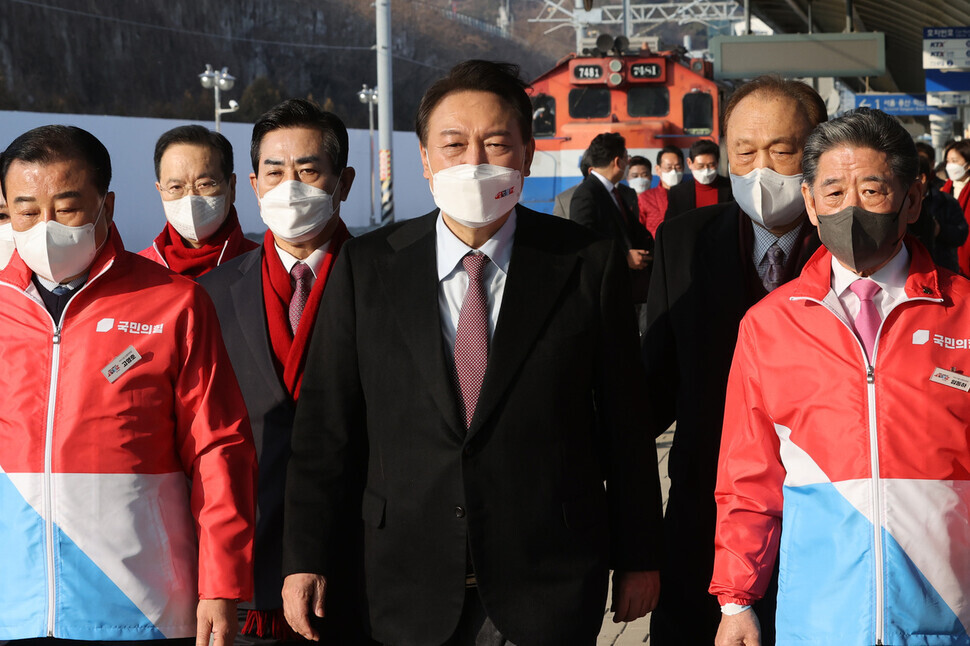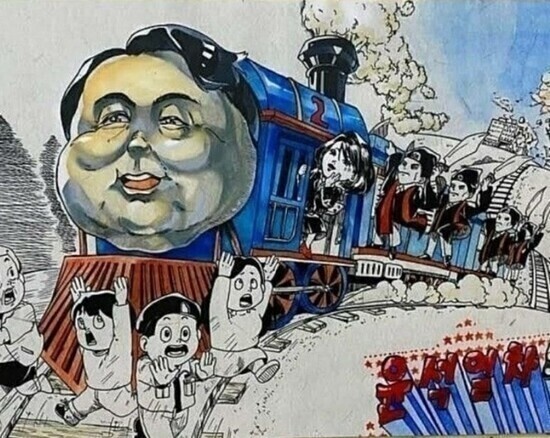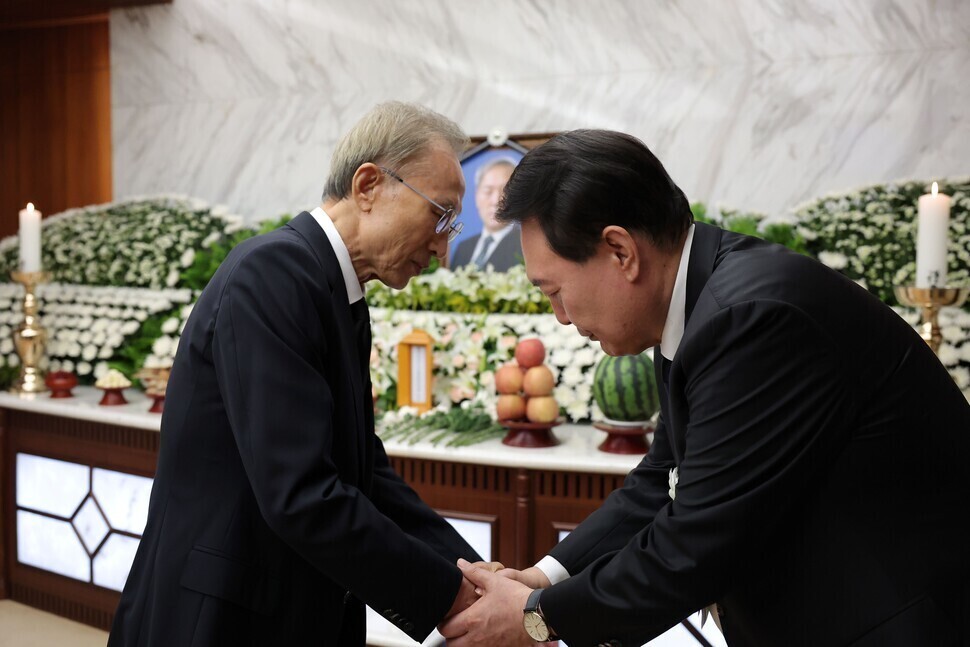hankyoreh
Links to other country sites 다른 나라 사이트 링크
Korean conservatives’ failed experiment with prosecutor-president is eroding their legitimacy

By definition, a great politician is one who effectively harmonizes the cause of achieving practical results that reflect their values with the personal desire to possess power. South Korea’s past presidents have generally been such individuals.
Even someone with outstanding values and causes will be unable to seize the opportunities to realize them if their thirst for power is weak. Some of the candidates in South Korea’s past presidential elections have been such individuals.
But what happens when someone whose values and causes are both weak blunders their way into power?
As a prosecutor, Yoon Suk-yeol displayed a sense of justice and unbending combativeness — a commitment to fighting against injustice and winning. He was similarly unbending toward Moon Jae-in, the president who appointed him as prosecutor general.
Desperately perceiving a need to return to power, so-called “conservatives” selected him as a candidate and backed him all the way to the presidency. In the words of Chosun Ilbo columnist Kim Dae-jung, he was an “accidental president” — a fact that Yoon himself is well aware of.
In transcripts recently reported on by The Tamsa, Yoon was quoted as saying the following to a People Power Party official in July 2021, shortly after he declared his presidential run:
“I’m someone who’s running to get a different party in power, not someone who’s running to be president. For me, the very position of ‘president’ is a nuisance — if I’m speaking honestly. But we need to turn things over, and there’s no one in the People Power Party who can do that.”
In simple terms, he was someone with a desire to win and a very strong lust for power. And he ended up running for president and winning without really knowing why he should be president or what he should do if he became president.
If he had just kept things at that level, he might have gone down in history as merely a somewhat incompetent president. Unfortunately, Yoon filled that gaping void instead with a late lurch toward the so-called “new right.”
The results of that have plunged not only Yoon himself but the Republic of Korea’s communities into a mire of division and crisis.

How did something like this happen? How did the prosecutor Yoon Suk-yeol — someone without the experience, values or causes needed to be president — end up becoming the president? To answer this, we need to look back at history.
“Conservatives” in South Korea are the descendants of Syngman Rhee, Park Chung-hee, and Chun Doo-hwan dictatorships. The dictators tried to smother democracy, but ended up being brought down repeatedly by citizen revolutions.
What allowed this “conservatism” to survive was the three-party merger of 1990. Roh Tae-woo’s “Democratic Justice” group were the forces responsible for a military coup, while Kim Young-sam’s “Reunification Democratic” group were the ones who achieved democratization. The Democratic Liberal Party succeeded in recapturing the presidency as a hybrid entity combining the figures behind the coup with the forces behind democratization.
Early on in his term, Kim Young-sam broadened the base for conservatism with forceful reforms. In 1996, many new figures were brought into the newly named New Korea Party, including Lee Jae-oh, Hong Joon-pyo, Kim Moo-sung, Lee Hoi-chang, and Hwang Woo-yea.
Lee Myung-bak, who held an at-large seat in the 14th National Assembly, successfully ran for a seat representing Seoul’s Jongno District.
The conservatives ended up losing the presidency in the wake of the Asian financial crisis in 1997. This time around, it was leader Lee Hoi-chang who infused new blood into the Grand National Party, including Yoo Seong-min, Oh Se-hoon, and Won Hee-ryong. Another figure here was Park Geun-hye, elected to the National Assembly in the by-elections of April 1998.
The bloc of those who had previously called themselves one sort of “Democrat” or another and the Lee Hoi-chang bloc consisted of politicians who were nothing like the original conservative establishment.
They were democratic, reform-minded, and above all, good at their jobs. This earned them modifiers “rational,” “reform” and “pragmatic” conservatives.
After 10 years of putting up with one another, the democratic conservatives and Lee Hoi-chang blocs were refashioned into the pro-Lee Myung-bak and pro-Park Geun-hye blocs. These two figures spearheaded innovation among Korea’s conservatives. Lee Myung-bak and Park Geun-hye were powerhouses, and their innovation made it possible for conservatives to hold onto the Blue House for two consecutive terms.
The Grand National Party’s creation of the Lee administration could be defined as a hybridization experiment of sorts, with established conservative politicians serving side by side with successful businesspersons.
The creation of Park Geun-hye was also an experiment on their part, in that they sprinkled in Park Chung-hee’s modernization.
The reason the conservative interbreeding worked as well as it did was that both Lee Myung-bak and Park Geun-hye were still politicians with considerable political experience: Lee had served multiple terms in the National Assembly and had been mayor of Seoul, while Park was a five-term lawmaker and chairperson of her party’s emergency leadership committee.
Crossbreeding experiments sometimes, to the dismay of their architects, result in the expression of inferior qualities. This was the case with Park Geun-hye, who came from a history of dictatorship, but fell from grace in an influence-peddling scandal that ended with her impeached and imprisoned.
This is where the conservatives should have ended their experimenting. They should have played a fair game by putting forward politicians who had demonstrated growth within the party and the National Assembly as their presidential candidates.

In the run-up to the 2017 presidential election, conservatives tried to solicit former UN Secretary General Ban Ki-moon to run on their behalf. The attempt was an utter failure.
Ahead of the 2022 presidential election, conservatives went back to the lab and concocted a never-before-seen recipe: What if the prosecutor general who served under Moon Jae-in ran as the conservative presidential candidate?
The rationale was that Yoon Suk-yeol’s inherent pursuit of justice and fairness aligned with conservative values, but the real reason was that the whole party was blinded by a vendetta against the Moon Jae-in administration.
The experiment appeared to be a success. When Yoon shouted “freedom” over 30 times in his inaugural address, conservatives cheered.
But as time wore on, more and more problems began to surface.
Now having been in office for a year and four months, Yoon has still yet to meet with the leader of the opposition. Instead, he has labeled his political opponents as adherents of “communist totalitarianism” and “anti-state forces.”
He has dismissed the head of the Marine Corps investigative service, who had steadfastly carried out his duties, and charged him with insubordination.
In the name of improving South Korea-Japan relations, Yoon established a quasi-alliance system with the US and Japan, which has led to the deterioration of Seoul’s relations with both China and Russia.
The Korea Military Academy is in an uproar over the relocation of a bust of independence fighter Hong Beom-do.
The Supreme Court granted a special pardon to Kim Tae-woo, the former chief of Seoul’s Gangseo District Office, who lost his post after being sentenced by the Supreme Court, and he has since been allowed to continue his career in politics.
Yoon is threatening to criminally prosecute journalists who reported stories critical of the current administration during the run-up to the presidential election.
To summarize, there isn’t a thing he is doing that is rooted in common sense.
Yoon is tearing down the conservative foundation that Kim Young-sam, Lee Hoi-chang, Lee Myung-bak, and Park Geun-hye built and expanded little by little. He is moving further and further away from the “rational,” “reform,” and “pragmatic” modifiers that were the driving forces behind the conservative revolution and return to power.
Recent polling on presidential job ratings and party approval ratings are evidence of this.
If this trend continues, the People Power Party will be met with a sound defeat in the general election to be held on April 10, 2024. The June 3, 2026, local elections and the March 3, 2027, presidential election will also be a rout.
But far more important than winning or losing elections is the future of Korea.
With Yoon’s rush toward the far right, the Democratic Party has more excuses to reject innovation and regress. Currently, we are stuck in a hostile coexistence: hate and anger dominate daily life, and political polarization is reaching a fever pitch. Our entire country is struck by this illness.
It seems reasonable to conclude that it was a huge mistake on the part of conservatives to push someone like this into the presidency. No one seems to be happy with how things are going.
“Still,” they say, “this is better than having Lee Jae-myung as president.”
How long will this flimsy excuse last?
Even a just fight will wear people downKang Chun-suk, an editorial advisor for the Chosun Ilbo, had a column in the newspaper’s Sept. 9 edition titled ‘‘The party with Yoon Suk-yeol and the party with Lee Jae-myung.’’
While the bulk of the column criticized the Democratic Party and Lee Jae-myung, the final lines took aim at the ruling party.
“Is the ruling party really walking down the path to become the majority? Syngman Rhee and Park Chung-hee never advocated pure traditionalism in their politics. They realized that in politics, as in nature, hybridity is more important than staying ‘pure,’ and they built their countries on that basis,” Kang wrote.
“History shows that when Germany and Japan tilted toward the notion of ‘purity,’ their nations took severe blows. Any war with no end in sight, even if it is being fought for the right reasons, can wear down people,” he went on. “Those who are tired will, eventually, turn away.”
Choi Hoon, the chief editor for the Joongang Ilbo, had a column titled “An ‘ideology war’, a double-edged sword” run in the Sept. 18 edition of the paper.
At the end, he quoted Yoon in the president’s own words, as relayed by a close aide.
“The comment on ideology came from the goal to seek wellbeing of the people. If the institutions of free democracy and market economy are not crystal clear, the well-being of the people cannot be guaranteed. His intention is to clarify the national identity for the sustainable well-being of the people and social development.”
While Choi Hoon evaluates this positively, I was dumbfounded. It’s a sad, sorry excuse for pushing the entire country into a pit of ideological warfare and then saying that was not the intention.
Now that conservative newspaper commentators have said their part, will Yoon flinch? Will his march going further and further to the right finally falter? I don’t think so.
Yoon is a man who became president because he didn’t listen to anyone and stuck to his guns. His recipe for success lies in believing that he is always right and charging ahead like a bull.
No one in the world would believe that their recipe to fame could fail, and Yoon is no different.
The problem is that Yoon’s unapologetic behavior is causing the South Korean community to become more and more divided and driving it toward catastrophe. What should be done? Who can stop Yoon’s stampede?
By Seong Han-yong, senior editorial writer
Please direct questions or comments to [english@hani.co.kr]

Editorial・opinion
![[Column] When ‘fairness’ means hate and violence [Column] When ‘fairness’ means hate and violence](https://flexible.img.hani.co.kr/flexible/normal/500/300/imgdb/original/2024/0516/7417158465908824.jpg) [Column] When ‘fairness’ means hate and violence
[Column] When ‘fairness’ means hate and violence![[Editorial] Yoon must stop abusing authority to shield himself from investigation [Editorial] Yoon must stop abusing authority to shield himself from investigation](https://flexible.img.hani.co.kr/flexible/normal/500/300/imgdb/original/2024/0516/4417158464854198.jpg) [Editorial] Yoon must stop abusing authority to shield himself from investigation
[Editorial] Yoon must stop abusing authority to shield himself from investigation- [Column] US troop withdrawal from Korea could be the Acheson Line all over
- [Column] How to win back readers who’ve turned to YouTube for news
- [Column] Welcome to the president’s pity party
- [Editorial] Korea must respond firmly to Japan’s attempt to usurp Line
- [Editorial] Transfers of prosecutors investigating Korea’s first lady send chilling message
- [Column] Will Seoul’s ties with Moscow really recover on their own?
- [Column] Samsung’s ‘lost decade’ and Lee Jae-yong’s mismatched chopsticks
- [Correspondent’s column] The real reason the US is worried about Chinese ‘overcapacity’
Most viewed articles
- 1China calls US tariffs ‘madness,’ warns of full-on trade conflict
- 2[Column] When ‘fairness’ means hate and violence
- 3[Column] US troop withdrawal from Korea could be the Acheson Line all over
- 4Could Korea’s Naver lose control of Line to Japan?
- 5[Editorial] Yoon must stop abusing authority to shield himself from investigation
- 6[Column] How to win back readers who’ve turned to YouTube for news
- 7DongA Ilbo and the government are told to apologize for past civil rights violations
- 8S. Korea’s spy agency ramping up national security investigations to keep itself relevant, critics s
- 9A Korean production studio may have made your favorite show – even if you don’t watch K-dramas
- 10[Column] Samsung’s ‘lost decade’ and Lee Jae-yong’s mismatched chopsticks